Popular Iranian Footballer Charged In Absentia For Supporting Protests
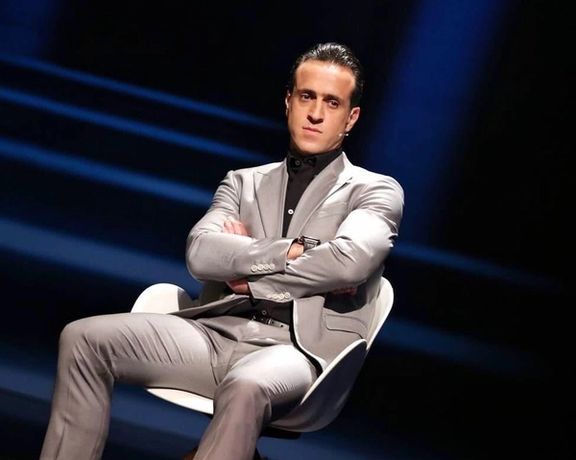
A popular Iranian former football (soccer) player has been charged in absentia for supporting ongoing antigovernment protests, Iran International has learned.

A popular Iranian former football (soccer) player has been charged in absentia for supporting ongoing antigovernment protests, Iran International has learned.
Ali Karimi who is currently abroad has been charged with unlawful “assembly and collusion with the intention of acting against national security.” This is an accusation the Islamic Republic regularly uses against dissidents and critics, with the slightest comment by an individual as grounds for a political crime.
Ali Karimi was one of the first celebrities who condemned the death of Mahsa Amini, who was killed while in the custody of Iran’s hijab police in September. Since then, Karimi has voiced support for protesters on social media becoming an icon for them. His tweets regularly generate more than 100,000 ‘likes’.
Iran International obtained the copy of a court document showing that Karimi has been charged. Although he is not in Iran, but his assets can be seized by the authorities.
Last week, security agents sealed the entrance of a villa near Tehran which was Karimi’s house, but later they removed the seal as they realized he had sold the property to someone else.
The popular protests in Iran do not have a clear leadership structure and are driven by teenagers and young people. Many celebrities who cooperate with the government to preserve their privileges in an authoritarian system, are careful not to praise the protesters. But those who side with them easily become more popular.
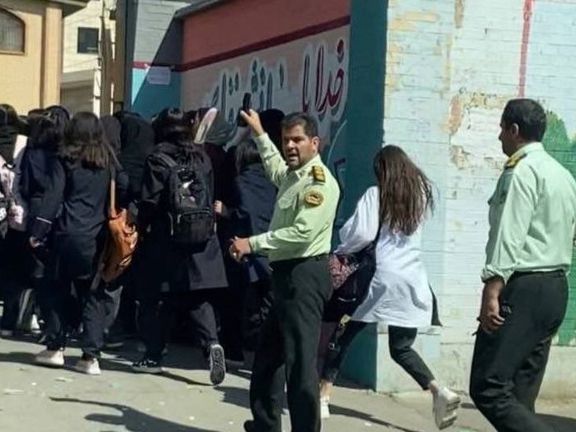
Following Supreme Leader Ali Khamenei’s lead, Iranian officials alleged on Tuesday that protests are instigated by foreign enemies while the unrest continues.
President Ebrahim Raisi on Tuesday accused “enemies of the Islamic Republic” of fomenting the protests, echoing what Khamenei said on Monday. Parliament Speaker Mohammad-Bagher Ghalibaf in turn vowed the parliament would take action to change the ways of the morality police in a bid to calm the protesters.
Protest rallies in universities continued Tuesday. A video shows students in their white uniforms staging a sit in on the campus of Rasht Medical Sciences University and holding placards silently. A video from Azad University in Najaf Abad, a conservative city in Esfahan Province, shows students clapping and chanting “Freedom, Freedom, Freedom”.
Social media users have also posted more videos of school children, particularly girls, refusing to attend classes and chanting in school yards and outside on Tuesday in various cities and towns including Tehran and Sanandaj. A video shows boys at a gifted students’ high school in Isfahan refusing to attend classes for a second day.
In many schools girls are refusing to wear their headscarves both in and outside the school. Girls and boys are also protesting by chanting, burning headscarves, writing graffiti, tearing down the photos of Khamenei and his predecessor, Ruhollah Khomeini, burning and trampling on the photos which are displayed in every classroom and government office.
Schoolgirls chanting "Women, Life, Freedom" on Tuesday, October 4
“We can’t study when the lives of our youth are being cut short, our brothers, our sisters,” a boy speaking at a student rally at a boys’ school says in a video posted on Twitter Tuesday.
In Esfahan, Iran's fourth most populous city, businesses went on strike Tuesday on one of the city’s major streets, Taleghani Ave, where most of the electronics shops are located. Several videos on social media show nearly all shops are closed or with shutters half-down.
There were no major late-night protests in Tehran and other cities Monday evening but in some areas of Tehran people continued to chant from their windows and rooftops and honked their horns in protest on busy roads.
“Don’t be mistaken. We’ll be out every night not just tonight!” people chanted Monday evening from their windows In Tehran’s western Ekbatan neighborhood, a massive apartment complex, while a group of youth marched from one apartment block to another chanting slogans such as “Death to Khamenei!”
“This system is being defeated because it has never had a theory about its own defeat. It only theorizes about its victory … You cannot contain this generation and interact with it with the same methods and thoughts as in the past,” Mohsen Renani, a renowned reformist economist and professor at Esfahan University, warned in a statement Monday. “Beware! Beware not to think that you can suppress [the protests] and all will be fine… It will remain like burning ambers under the ashes and reignite,” he added.
The IRGC which has so far not used overwhelming military force against protesters on the streets, continued its mortar and drone attacks on the positions of Kurdish Iranian insurgent groups in Iraqi Kurdistan for the eleventh consecutive day.
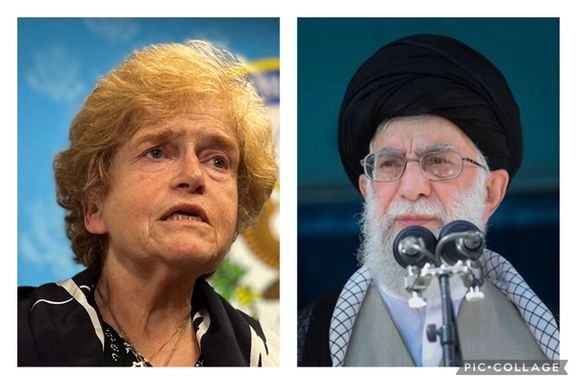
US envoy for battling antisemitism says the entire world as well as the Iranian people know that Islamic Republic’s inherent misogyny has sparked the current women-led uprising.
Special Envoy to Monitor and Combat Antisemitism Deborah E. Lipstadt said late Monday that Supreme Leader Ali Khamenei "can blame ‘Zionists,' the US, or anyone else, but it’s clear to the world and the Iranian people that his regime’s violent misogyny ignited these women-led protests.”
She was referring to Supreme Leader Ali Khamenei’s first reaction to ongoing unrest on Monday, saying that the protests were planned and not staged by "ordinary Iranians…I am saying explicitly and clearly, riots and insecurity were planned by America and the usurper, fake Zionist regime,” said the aging 83-year-old Khamenei who has ruled for 33 years.
Echoing Khamenei’s remarks, Iran’s President Ebrahim Raisi said on Tuesday the ongoing protests – triggered by the death in custody of 22-year-old Mahsa Amini -- are a riot organized by the US and Israel in order to prevent the Islamic Republic’s progress.
Also on Monday, US Congressman Brad Sherman (D-Calif) said that “Today the Ayatollah erroneously tried to blame the US and Israel for Iran’s protests.”
Referring to a bipartisan and bicameral resolution to commemorate Mahsa Amini's death and to convey US support for the protests, the representative added that “through resolutions like this, the world is showing that the truth behind the protests is clear, and that the support behind those calling for equality and justice in Iran is resolute.”
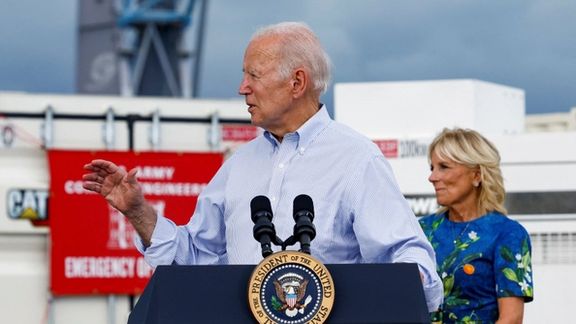
Iran’s government and media remained largely silent on Tuesday over US President Joe Biden’s condemnation of the violent crackdown against protesters in Iran.
Biden issued a statement on Monday saying he remains “gravely concerned about reports of the intensifying violent crackdown on peaceful protestors in Iran, including students and women, who are demanding their equal rights and basic human dignity.”
But the President went further and said, "This week, the United States will be imposing further costs on perpetrators of violence against peaceful protestors. We will continue holding Iranian officials accountable and supporting the rights of Iranians to protest freely."
Earlier in the day, Iran’s Supreme leader Ali Khamenei had already blamed more than two weeks of street protests on the United States, which he again labeled as “the enemy”.
The only response by Iran was a low-key statement by the spokesman of the foreign ministry Nasser Kanaani on Instagram, where he repeated customary criticism of US ignoring human rights in “Palestine and Yemen”.
Many Iranians saw Biden’s statement as a show of support that was more than what they had expected. Iranian activists and many others who reject the Islamic Republic do not forget President Barack Obama’s initial meek response to large protests in 2009. But Biden sounded a bit more resolute, given the fact that his administration has been negotiating for a year and a half to revive the Obama-era nuclear deal known as JCPOA and lift the sanctions imposed on Iran.
“For decades, Iran’s regime has denied fundamental freedoms to its people and suppressed the aspirations of successive generations through intimidation, coercion, and violence,” he said.

Gabriel Noronha, a former Trump administration official, reminded the public on Twitter that Secretary of State Antony Blinken in December 2017 had endorsed an advice to Donald Trump to remain silent over nationwide protests that had broken out in Iran.
Considering that the Biden Administration has not relinquished hopes of reviving the JCPOA and might still reopen suspended talks with Iran in the weeks and months ahead, Biden’s tougher position on Iran’s violations of human rights is a bit surprising.
Previous rounds of protests in Iran generally received less attention by Western media that has often treated the clerical regime with kid gloves. But this time it is different for several reasons.
First, it is important that the protests began when a 22-year-old woman was arrested for “improper hijab” and then received fatal head wounds in police custody and died. Mahsa Amini’s story caught the attention of the world and her hashtag surpassed 100 million retweets, easily dwarfing any previous issue.
Second, mostly very young Iranians began protests and persevered for more than two weeks, bringing images of teenage girls removing their headscarves and facing a brutal security force that in November 2019 had killed more than 1,500 protesters without hesitation.
Third, the power of social media in bringing these events to billions of smart phones made classic media a bit irrelevant. No one waited to see what the New York Times reports, and far, far fewer people would even read any reporting compared to hundreds of millions who instantly saw what was happening in Iran on their phones and computers.
These factors made the Iran issue powerful, and Biden reacted a bit differently than Obama. Mahsa Amini became a face people everywhere could relate to and easily understand what is wrong in Iran.
The old arguments that criticizing the clerical rulers in Iran would harm dissidents or lessen the chance of a rapprochement with Tehran, seemed weak - an Obama-era view that was tested and failed.
The argument of those who have been saying that the Islamic Republic is a multi-faceted threat and not just a nuclear issue has been strengthened. Europeans also seem to have been a bit shaken by Mahsa Amini’s death and it won’t be easy for Iran’s clerical rulers to overcome the international awareness about the nature of their rule.
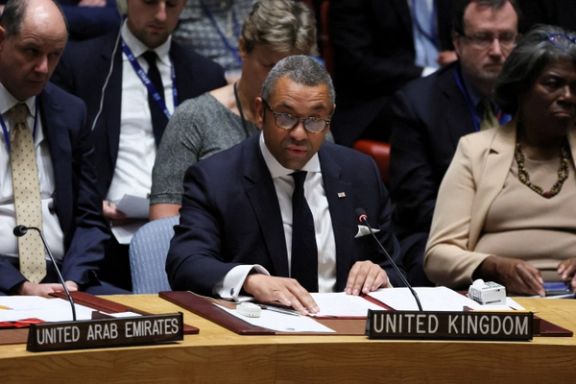
Britain's foreign ministry on Monday said it had summoned the Iranian charge d’affaires, Iran’s most senior diplomat in Britain, over the crackdown on protests.
"The violence levelled at protesters in Iran by the security forces is truly shocking," British Foreign Secretary James Cleverly said, referring to the Islamic Republic’s clampdown on popular protests triggered by the death of Mahsa Amini, the 22-year-old woman who was killed in police custody.
"Today we have made our view clear to the Iranian authorities – instead of blaming external actors for the unrest, they should take responsibility for their actions and listen to the concerns of their people," Cleverly said.
Also on Monday, US President Joe Biden forcefully condemns Iran's regime's crackdown on protesters, saying "this week, the United States will be imposing further costs on perpetrators of violence against peaceful protestors."
Late in September, Iran’s foreign ministry had summoned the British ambassador in Tehran over what it called “a hostile atmosphere” created by London-based Persian media outlets. There are three London-based major Iranian satellite TV channels beaming programs into Iran; Iran International TV, Manoto TV and BBC Persian.
France also condemned in the strongest terms the continued brutal repression of demonstrations in Iran, and demanded that Iran cease this repression immediately. France is particularly shocked by the violence committed against the demonstrators, in particular at the University of Sharif on Sunday night. The Chargé d'Affaires of the Iranian Embassy was also summoned to the French Ministry for Europe and Foreign Affairs last Friday.
Germany also summoned Iran’s ambassador on September 26 over Tehran’s heavy-handed crackdown on the popular protests.
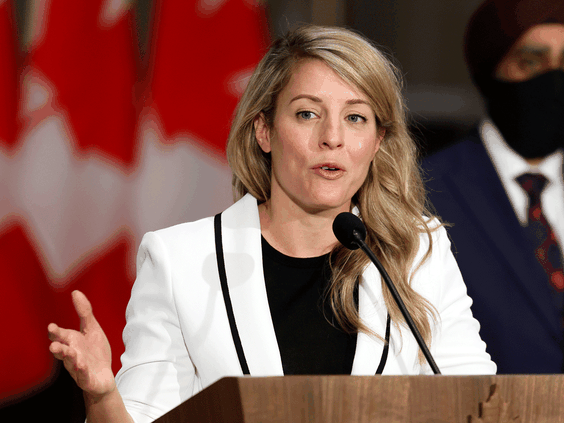
Canada has slapped sanctions on 34 Iranian officials and entities, including the Islamic Revolutionary Guard Corps (IRGC) and morality police, over the crackdown on current protests.
Foreign Affairs Minister Melanie Joly announced the list of sanctions on Monday, about a week after Canadian Prime Minister Justin Trudeau promised measures against the government.
The list includes 25 individuals such as Mohammed-Hossein Bagheri, Major General in the Revolutionary Guard (IRGC) and the Chief of Staff of Iran’s Armed Forces; Major General Hossein Salami, IRGC Commander-in-Chief; Esmail Qaani, Commander of the IRGC’s Quds Force; as well as on IRGC’s Cyber Defense Command; Evin Prison -- which houses political prisoners – and Intelligence Minister Esmail Khatib.
"These sanctions are in response to gross human rights violations that have been committed in Iran, including its systematic persecution of women and in particular, the egregious actions committed by Iran's so-called 'Morality Police,' which led to the death of Mahsa Amini while under their custody," a government news release said.
Joly tweeted later in the day that “Iran’s continued grave and ongoing breaches of international law are well known and documented, including its blatant disregard for human life.”
Canada had earlier imposed sanctions on a total of 41 Iranian individuals and 161 Iranian entities before today’s list.
In 2012, Canada designated Iran as a state supporter of terrorism under the State Immunity Act, which allows victims to bring civil action against Iran for losses or damages from an act of terrorism with links to Iran committed anywhere in the world.